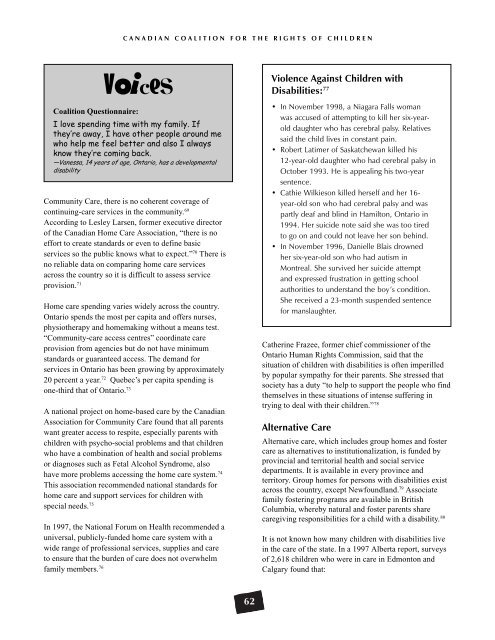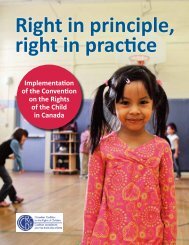Poste - Canadian Coalition for the Rights of Children
Poste - Canadian Coalition for the Rights of Children
Poste - Canadian Coalition for the Rights of Children
Create successful ePaper yourself
Turn your PDF publications into a flip-book with our unique Google optimized e-Paper software.
C A N A D I A N C O A L I T I O N F O R T H E R I G H T S O F C H I L D R E N<br />
Voices<br />
<strong>Coalition</strong> Questionnaire:<br />
I love spending time with my family. If<br />
<strong>the</strong>y’re away, I have o<strong>the</strong>r people around me<br />
who help me feel better and also I always<br />
know <strong>the</strong>y’re coming back.<br />
—Vanessa, 14 years <strong>of</strong> age, Ontario, has a developmental<br />
disability<br />
Community Care, <strong>the</strong>re is no coherent coverage <strong>of</strong><br />
continuing-care services in <strong>the</strong> community. 69<br />
According to Lesley Larsen, <strong>for</strong>mer executive director<br />
<strong>of</strong> <strong>the</strong> <strong>Canadian</strong> Home Care Association, “<strong>the</strong>re is no<br />
ef<strong>for</strong>t to create standards or even to define basic<br />
services so <strong>the</strong> public knows what to expect.” 70 There is<br />
no reliable data on comparing home care services<br />
across <strong>the</strong> country so it is difficult to assess service<br />
provision. 71<br />
Home care spending varies widely across <strong>the</strong> country.<br />
Ontario spends <strong>the</strong> most per capita and <strong>of</strong>fers nurses,<br />
physio<strong>the</strong>rapy and homemaking without a means test.<br />
“Community-care access centres” coordinate care<br />
provision from agencies but do not have minimum<br />
standards or guaranteed access. The demand <strong>for</strong><br />
services in Ontario has been growing by approximately<br />
20 percent a year. 72 Quebec’s per capita spending is<br />
one-third that <strong>of</strong> Ontario. 73<br />
A national project on home-based care by <strong>the</strong> <strong>Canadian</strong><br />
Association <strong>for</strong> Community Care found that all parents<br />
want greater access to respite, especially parents with<br />
children with psycho-social problems and that children<br />
who have a combination <strong>of</strong> health and social problems<br />
or diagnoses such as Fetal Alcohol Syndrome, also<br />
have more problems accessing <strong>the</strong> home care system. 74<br />
This association recommended national standards <strong>for</strong><br />
home care and support services <strong>for</strong> children with<br />
special needs. 75<br />
In 1997, <strong>the</strong> National Forum on Health recommended a<br />
universal, publicly-funded home care system with a<br />
wide range <strong>of</strong> pr<strong>of</strong>essional services, supplies and care<br />
to ensure that <strong>the</strong> burden <strong>of</strong> care does not overwhelm<br />
family members. 76<br />
62<br />
Violence Against <strong>Children</strong> with<br />
Disabilities: 77<br />
• In November 1998, a Niagara Falls woman<br />
was accused <strong>of</strong> attempting to kill her six-yearold<br />
daughter who has cerebral palsy. Relatives<br />
said <strong>the</strong> child lives in constant pain.<br />
• Robert Latimer <strong>of</strong> Saskatchewan killed his<br />
12-year-old daughter who had cerebral palsy in<br />
October 1993. He is appealing his two-year<br />
sentence.<br />
• Cathie Wilkieson killed herself and her 16year-old<br />
son who had cerebral palsy and was<br />
partly deaf and blind in Hamilton, Ontario in<br />
1994. Her suicide note said she was too tired<br />
to go on and could not leave her son behind.<br />
• In November 1996, Danielle Blais drowned<br />
her six-year-old son who had autism in<br />
Montreal. She survived her suicide attempt<br />
and expressed frustration in getting school<br />
authorities to understand <strong>the</strong> boy’s condition.<br />
She received a 23-month suspended sentence<br />
<strong>for</strong> manslaughter.<br />
Ca<strong>the</strong>rine Frazee, <strong>for</strong>mer chief commissioner <strong>of</strong> <strong>the</strong><br />
Ontario Human <strong>Rights</strong> Commission, said that <strong>the</strong><br />
situation <strong>of</strong> children with disabilities is <strong>of</strong>ten imperilled<br />
by popular sympathy <strong>for</strong> <strong>the</strong>ir parents. She stressed that<br />
society has a duty “to help to support <strong>the</strong> people who find<br />
<strong>the</strong>mselves in <strong>the</strong>se situations <strong>of</strong> intense suffering in<br />
trying to deal with <strong>the</strong>ir children.” 78<br />
Alternative Care<br />
Alternative care, which includes group homes and foster<br />
care as alternatives to institutionalization, is funded by<br />
provincial and territorial health and social service<br />
departments. It is available in every province and<br />
territory. Group homes <strong>for</strong> persons with disabilities exist<br />
across <strong>the</strong> country, except Newfoundland. 79 Associate<br />
family fostering programs are available in British<br />
Columbia, whereby natural and foster parents share<br />
caregiving responsibilities <strong>for</strong> a child with a disability. 80<br />
It is not known how many children with disabilities live<br />
in <strong>the</strong> care <strong>of</strong> <strong>the</strong> state. In a 1997 Alberta report, surveys<br />
<strong>of</strong> 2,618 children who were in care in Edmonton and<br />
Calgary found that:




